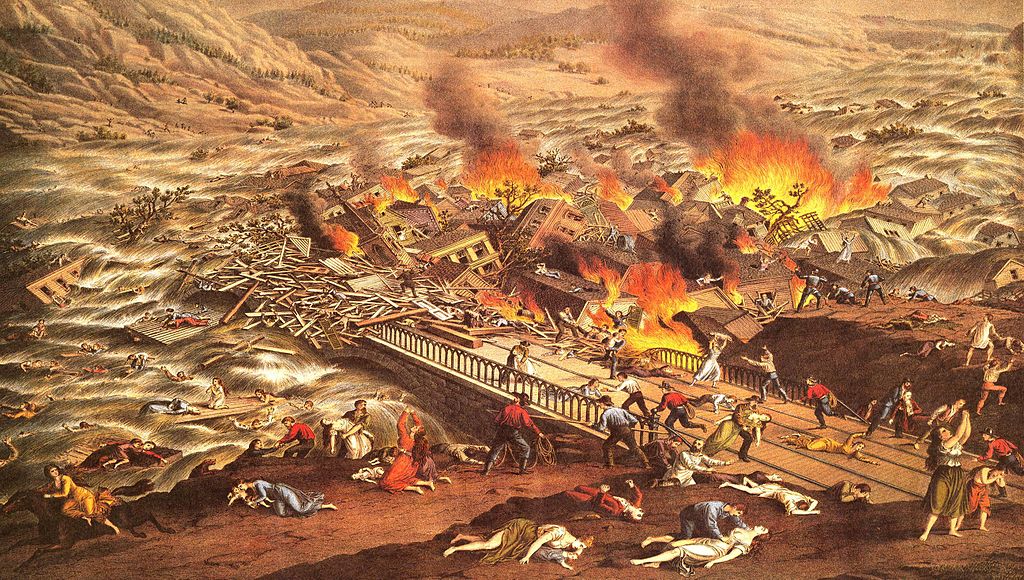Key Difference – Calamity vs Disaster
Both Calamity and disaster refer to events that cause damage, destruction, and loss. Although these two words can be used interchangeably, there is a subtle difference between calamity and disaster. The key difference between calamity and disaster would be their severity; calamity is considered to be more severe and destructive than disaster. However, disaster is the most commonly used word out of these two words.
What Does Calamity Mean?
A calamity is an event that causes great distress, harm, and suffering. It is defined by the Oxford dictionary as “an event causing great and often sudden damage or distress” and by American Heritage dictionary as “an event that brings terrible loss, lasting distress, or severe affliction”. Although the noun calamity is not often used in modern English, it is a synonym for disaster, catastrophe, etc. Look at the following example sentences to understand the meaning and usage of this noun more clearly.
Emergency measures should be taken for floods, earthquakes, and other calamities.
The president said that we should stand together as one nation to face this great calamity.
It was difficult to say who suffered more losses from this calamity.
The government provided funds for those who have lost their houses in this calamity.
According to Merriam-Webster’s Dictionary of Synonyms (1984), there is a subtle difference between calamity and its synonyms. It describes calamity as follows:
“Calamity is a grievous misfortune, particularly one which involves a great or far-reaching personal or public loss or which produces profound, often widespread distress”
Examples of such calamities would include 2004 Tsunami, assassination of a country’s leader (e.g. John. F. Kennedy, Indira Gandhi) and 1931 China floods.
What Does Disaster Mean?
A disaster is a sudden event that brings great damage, loss, and destruction. Disaster is defined by the Oxford dictionary as “a sudden accident or a natural catastrophe that causes great damage or loss of life”. American Heritage dictionary defines it as “an occurrence causing widespread destruction and distress”. The term disaster is often used to refer to natural disasters such as floods, earthquakes, tsunamis, etc. Look at the following sentences to understand its meaning better.
His New Year party was a complete disaster.
The government was accused of not having a proper disaster recovery plan.
More than 1000 people have died in this disaster.
Natural disasters like wildfires, earthquakes, and floods often affected this region.
Their new project is a financial disaster.
When compared with calamity, disaster is less intense and severe. The Merriam-Webster’s Dictionary of Synonyms (1984) describes disaster as follows:
“A disaster is an unforeseen mischance or misadventure … which happens either through culpable lack of foresight or through adverse external agency and brings with it destruction or ruin”
Examples of disasters would be a shipwreck, a serious bus accident, and failure of a big business.
What is the difference between Calamity and Disaster?
Definition:
Calamity: A calamity is an event that brings terrible loss, lasting distress, or severe affliction.
Disaster: A disaster is a sudden accident or a natural catastrophe that causes great damage or loss of life.
Severity:
Calamity: Calamity is more severe and damaging than a disaster.
Disaster: Disaster may not be as severe or destructive as a calamity.
Usage of the Terms:
Calamity: Calamity is rarely used in modern writing.
Disaster: Disaster is the commonly used word out of the two words.
Reference:
Merriam-Webster, Inc. Merriam-Webster’s Dictionary of Synonyms: A Dictionary of Discriminated Synonyms with Antonyms and Analogous and Contrasted Words. Merriam-Webster, 1984.
